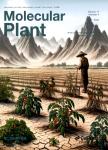Unraveling a genetic roadmap for improved taste in the domesticated apple
作者机构:CAS Key Laboratory of Plant Germplasm Enhancement and Specialty AgricultureHubei Hongshan LaboratoryWuhan Botanical GardenThe Innovative Academy of Seed DesignChinese Academy of SciencesWuhan 430074China Agricultural Bioinformatics Key Laboratory of Hubei ProvinceCollege of InformaticsHuazhong Agricultural UniversityWuhan 430070China Center of Economic BotanyCore Botanical GardensChinese Academy of SciencesWuhan 430074China University of Chinese Academy of Sciences19A YuquanluBeijing 100049China College of Horticulture Science and EngineeringShandong Agricultural UniversityTai-An 271018China Sino-African Joint Research CenterChinese Academy of SciencesWuhan 430074China The New Zealand Institute for Plant&Food Research LimitedAucklandNew Zealand School of Biological SciencesUniversity of AucklandPrivate Bag 92019Auckland 1142New Zealand Plant Pathology and Plant-Microbe Biology SectionCornell UniversityGenevaNY 14456USA Department of Natural Resources and Environmental SciencesUniversity of Illinois at Urbana-ChampaignUrbanaIL 61801USA Boyce Thompson InstituteCornell UniversityIthacaNY 14853USA Department of Plant BiologyUniversity of Illinois at Urbana-ChampaignUrbanaIL 61801USA
出 版 物:《Molecular Plant》 (分子植物(英文版))
年 卷 期:2021年第14卷第9期
页 面:1454-1471页
核心收录:
学科分类:09[农学] 0902[农学-园艺学] 090201[农学-果树学]
基 金:This project was financially supported by the National Key R&D Program of China(2018YFD1000200) the Special Fund for Strategic Pilot Technology of the Chinese Academy of Sciences(XDA24030404-4) the National Natural Science Foundation of China(31420103914 and 31872059) the Overseas Construction Plan for Science and Education Base,China-Africa Center for Research and Education,Chinese Academy of Sciences(grant no.SAJC201327)
主 题:apple fruit taste organic acids soluble sugars fruit size domestication
摘 要:Although taste is an important aspect of fruit quality, an understanding of its genetic control remains elusive in apple and other fruit crops. In this study, we conducted genomic sequence analysis of 497 Malus accessions and revealed erosion of genetic diversity caused by apple breeding and possible independent domestication events of dessert and cider apples. Signatures of selection for fruit acidity and size, but not for fruit sugar content, were detected during the processes of both domestication and improvement. Furthermore, we found that single mutations in major genes affecting fruit taste, including Ma1, MdTDT, and MdSOT2, dramatically decrease malate, citrate, and sorbitol accumulation, respectively, and correspond to important domestication events. Interestingly, Ma1 was identified to have pleiotropic effects on both organic acid content and sugar:acid ratio, suggesting that it plays a vital role in determining fruit taste. Fruit taste is unlikely to have been negatively affected by linkage drag associated with selection for larger fruit that resulted from the pyramiding of multiple genes with minor effects on fruit size. Collectively, our study provides new insights into the genetic basis of fruit quality and its evolutionary roadmap during apple domestication, pinpointing several candidate genes for genetic manipulation of fruit taste in apple.



